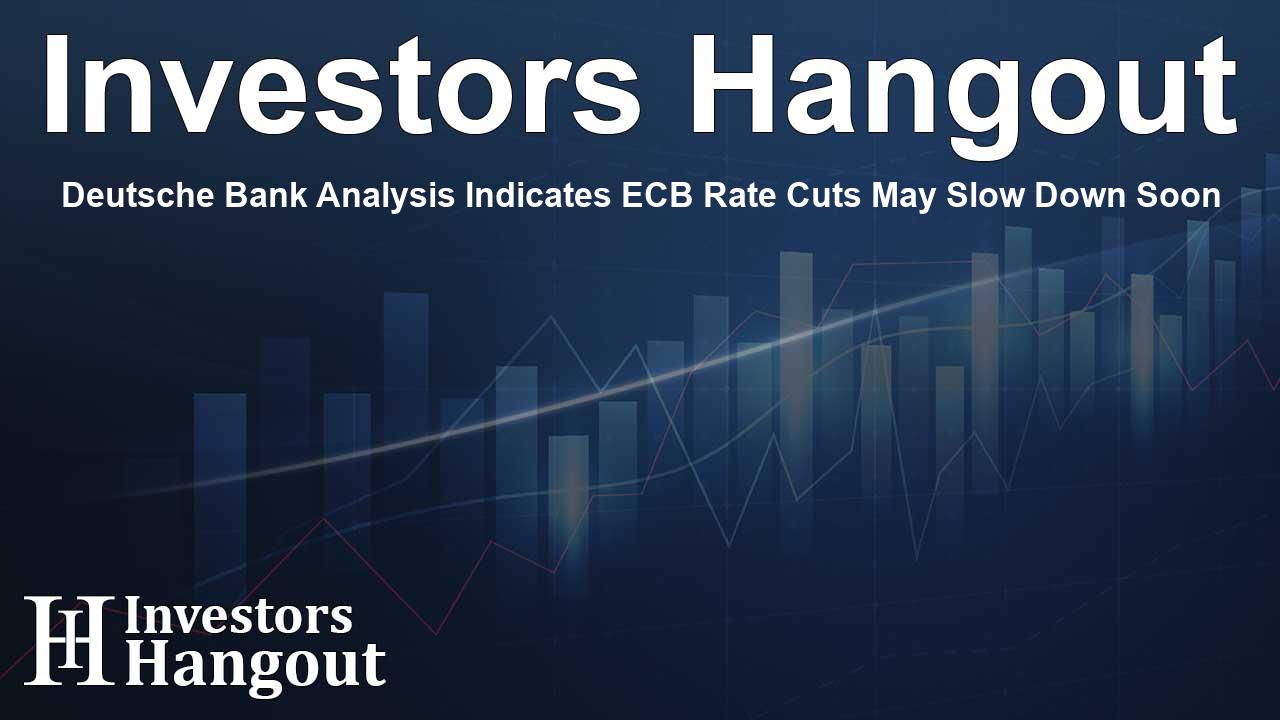Deutsche Bank Analysis Indicates ECB Rate Cuts May Slow Down Soon

Deutsche Bank's Forecast on ECB Interest Rate Cuts
The European Central Bank (ECB) is anticipated to slow its pace of interest rate cuts this year, particularly in the third quarter, according to insights from analysts at Deutsche Bank (ETR: DBKGn). This analysis indicates a shifting trend in monetary policy as central banks navigate economic challenges.
Market Reactions and Expectations
Economists widely expect the ECB to implement a quarter of a percentage point rate reduction at its forthcoming policy meeting. This follows four previous rate cuts aimed at stimulating growth and addressing moderating inflation in the Eurozone. Market participants have increased their expectations regarding future cuts.
Influence of Global Trade Dynamics
Recent geopolitical developments, notably the actions of US leadership on import tariffs, have influenced market sentiments positively. The current market anticipations lean towards a total of four interest rate reductions by 2025. Such adjustments could potentially lower the deposit rate provided by the ECB to 2% by the end of this year.
ECB Officials' Stance
Central bank policymakers have bolstered their forecasts, indicating a strong likelihood of further reductions at the ECB's January meeting. ECB President Christine Lagarde has remarked on the necessity for a measured approach, suggesting that a gradual reduction is a consideration.
Deutsche Bank's Predictions
In a recent communication to clients, analysts at Deutsche Bank, led by Mark Wall, outlined their expectation of a 25 basis point cut at each of the Advisory Council meetings in the first half of 2025. Thereafter, the analysts predict that the pace of cuts will moderate, proposing decreases during the September and December meetings.
Future Economic Considerations
The underlying assumptions of these predictions include expectations of subpar economic growth and inflation rates that fall below target levels, alongside risks leaning towards downward pressure on inflation. Due to these factors, analysts note that the ECB may consider slowing down their cuts earlier, potentially within the second quarter.
Frequently Asked Questions
What did Deutsche Bank predict about ECB rate cuts?
Deutsche Bank predicts that the ECB may slow the pace of interest rate cuts, particularly in the third quarter, with potential reductions starting sooner.
What factors influence ECB's decision-making?
Economic growth, inflation rates, and global trade dynamics significantly influence the ECB's monetary policy decisions.
What is the expected impact on deposit rates?
The anticipated rate cuts could reduce the ECB's deposit rate to 2% by the end of the year, according to market expectations.
How many rate cuts does Deutsche Bank foresee in 2025?
Deutsche Bank projects a total of four rate cuts during 2025, with initial cuts in the first half and a slowdown in the latter half.
What might cause the ECB to cut rates sooner?
The ECB could opt for earlier cuts if economic indicators show continued below-trend growth or persistent low inflation concerns.
About Investors Hangout
Investors Hangout is a leading online stock forum for financial discussion and learning, offering a wide range of free tools and resources. It draws in traders of all levels, who exchange market knowledge, investigate trading tactics, and keep an eye on industry developments in real time. Featuring financial articles, stock message boards, quotes, charts, company profiles, and live news updates. Through cooperative learning and a wealth of informational resources, it helps users from novices creating their first portfolios to experts honing their techniques. Join Investors Hangout today: https://investorshangout.com/
Disclaimer: The content of this article is solely for general informational purposes only; it does not represent legal, financial, or investment advice. Investors Hangout does not offer financial advice; the author is not a licensed financial advisor. Consult a qualified advisor before making any financial or investment decisions based on this article. The author's interpretation of publicly available data presented here; as a result, they should not be taken as advice to purchase, sell, or hold any securities mentioned or any other investments. If any of the material offered here is inaccurate, please contact us for corrections.